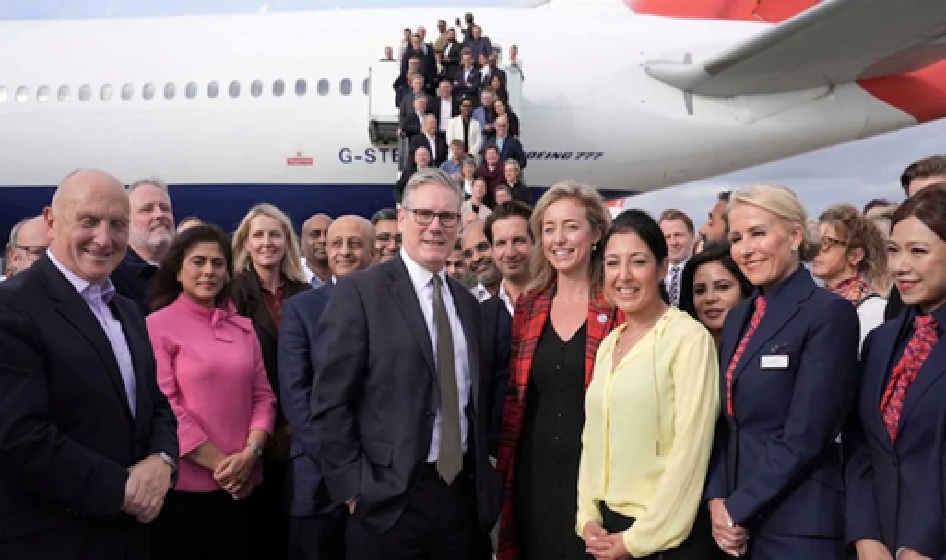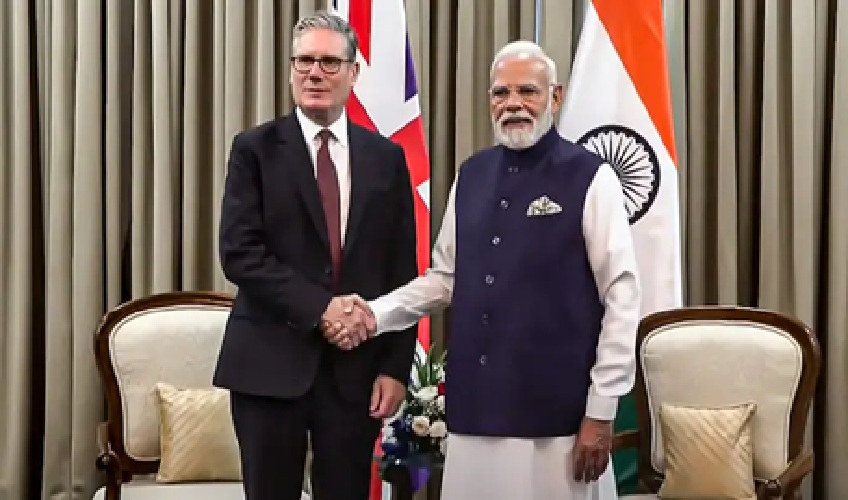
- Prime Minister Starmer hailed the growing partnership between India and the UK, emphasising that he wanted the free trade agreement to be implemented as soon as possible.
- The evolving India-United Kingdom partnership is not merely about trade—it represents a broader strategic alignment rooted in shared democratic values, mutual economic benefits, and converging geopolitical interests.
- Agreements were reached on the establishment of an India-UK Connectivity and Innovation Centre in India, along with a joint Centre for Artificial Intelligence.
- As the Indo-Pacific has become the new epicentre of global geopolitics, with more than 50 per cent of world trade passing through this region, European nations are seeking greater access and influence there.
United Kingdom Prime Minister Keir Starmer’s first visit to India since taking office last year was a very special one. This visit came just months after the signing of the Comprehensive Economic and Trade Agreement (CETA) between India and the United Kingdom in July, which was concluded during Prime Minister Modi’s visit to the UK that month. The visit was also significant as more than 100 delegates accompanied Prime Minister Starmer, including entrepreneurs, cultural representatives, and vice chancellors from UK universities, all aiming to boost overall ties between India and the United Kingdom.
Prime Minister Starmer met Prime Minister Modi in Mumbai during the two-day visit. Starmer hailed the growing partnership between India and the UK, emphasising that he wanted the free trade agreement to be implemented as soon as possible. He also remarked that India would soon become the world’s third-largest economy and that the United Kingdom was ready to contribute to that growth.
Prime Minister Modi noted that the relationship between India and the United Kingdom is bound by shared values of democracy and the rule of law, reaffirming his commitment to strengthening bilateral relations.
Key Agreements Strengthening India–UK Ties
Several key agreements were made during the visit. India signed a 468 million dollar deal with the United Kingdom to purchase lightweight multi-use Martlet missiles. These missiles can be launched from surface-to-air and surface-to-surface platforms and are produced in Northern Ireland. The defence deal is expected to create nearly 700 jobs in the United Kingdom, and Prime Minister Starmer hailed it as a major step forward in defence cooperation between the two nations.
Additionally, a Memorandum of Understanding (MoU) was signed between the British Film Institute and India’s National Film Development Corporation (NFDC), agreeing to facilitate the production of Indian films in the United Kingdom, thereby generating employment and prosperity in both countries.
A major announcement during the visit was the decision to allow nine UK universities to open campuses across India. This decision was made following a meeting between Prime Minister Modi and nine vice chancellors from leading UK universities. Modi welcomed this as a landmark step in educational collaboration. It was also the largest British delegation to visit India in over a decade. Another MoU was signed to enable 64 Indian investments worth 1.3 billion euros, creating around 7,000 jobs in the United Kingdom.
Furthermore, agreements were reached on the establishment of an India-UK Connectivity and Innovation Centre in India, along with a joint Centre for Artificial Intelligence. The two sides also agreed to set up an India-UK Critical Mineral Supply Chain Observatory and a new satellite campus of IIT Dhanbad in partnership with UK institutions. It is important to note that negotiations for the India-UK Free Trade Agreement began during the tenure of the Conservative government. The idea was first discussed under Prime Minister Boris Johnson, with a Deepavali deadline set for completion in 2022. However, it took almost three years for both sides to finally sign the much-anticipated agreement.
For the United Kingdom, this trade deal holds major importance, especially after its exit from the European Union in 2020. Since Brexit, the UK has been seeking greater investments from outside Europe to achieve economic independence. One of the main reasons cited for leaving the EU was the heavy red tape that restricted its global trade flexibility.
At the same time, Europe as a whole is witnessing a trend of economic decoupling and de-risking from China due to growing geopolitical tensions. Although China remains a major trading partner for many European countries, they are now looking for alternative markets, and India stands out as one of the most promising options.
India – The Solution to the UK’s Economic Problems

The Labour regime headed by Prime Minister Starmer is not in a very strong position in the United Kingdom, as his approval rating has fallen to a historic low. There is growing anti-incumbency sentiment just one year into his prime ministership. He is facing several challenges – from issues of immigration, economic stagnation, and technical shortcomings to concerns over freedom of speech and expression, as the government has been accused of targeting people for voicing their opinions.
Amid all this, the United Kingdom’s relations with India matter greatly. India can be a possible solution to Prime Minister Starmer’s economic problems. Not only will the United Kingdom’s stagnating defence and industrial sectors get a boost by exporting products and conducting business with India, but Indian investments are also expected to generate new demand within the UK. It is anticipated that Indian investments could create around 7,000 jobs.
More importantly, through deeper cooperation with India, the United Kingdom can find a better market base and expand its reach across Asia. Hence, the India-UK deal truly matters for the United Kingdom.
Strategically, Prime Minister Starmer also seems to be positioning himself amid the ongoing strain in India–United States relations, which have reached a point that appears nearly beyond repair. In such a scenario, as tensions rise between India and the United States, Starmer may be trying to use this moment strategically to strengthen ties with India.
A Political and Economic Win for India
This partnership is also a political and economic win for India. It offers New Delhi a new economic ally at a time when tariffs imposed by the United States on Indian goods, currently around 50 per cent, pose challenges. Strengthening ties with the UK can help India partially offset these shocks.
For the UK as well, this partnership provides a much-needed economic opening, especially under the current inward-looking policies of United States President Donald Trump. The United States has introduced protectionist measures that have even affected traditional allies like the UK, making it difficult for British companies to access the American market. Therefore, the UK now seeks alternative opportunities, and given the geopolitical uncertainties surrounding China, India has emerged as the most suitable destination.
Beyond economics, the United Kingdom also aims to strengthen its geopolitical presence in Asia through India. As the Indo-Pacific has become the new epicentre of global geopolitics, with more than 50 per cent of world trade passing through this region, European nations are seeking greater access and influence there. For them, India serves as a strategic partner to ensure economic and geopolitical stability in the Indo-Pacific, particularly in balancing China’s growing influence.
Thus, the evolving India-United Kingdom partnership is not merely about trade. It represents a broader strategic alignment rooted in shared democratic values, mutual economic benefits, and converging geopolitical interests.
Aayush Pal is a freelance writer on contemporary geopolitical developments. The views expressed in his work are entirely his own.
